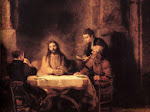 |
| Sermon on the Mount - Carl Henrich Bloch - 1877 |
This view might surprise many Christians who either reject or belittle tradition out of a mistaken notion that sola scriptura (Scripture alone) means Scripture stripped from any churchly context of tradition. It also may surprise many Catholic Christians who view tradition as a parallel, or even an independent source of authoritative teaching, or even as revelation.
The writer of Hebrews clarifies God speaks to us (reveals Himself) in the Old Testament, and now through
 |
| The Evangelist Matthew Inspired by an Angel Rembrandt (1661) |
The apostolic tradition in the New Testament constantly urges us to obey what Jesus commanded, out of our love for Him, especially to love one another. (1 John 2:3-6; 3:11 & 23.) The Church thus considers the New Testament authoritative, as well as the Old Testament as interpreted by the New Testament. Scripture serves as the standard by which the Church adheres to in following the head of the Church, Jesus Christ. (2 Timothy 3:16-17; Colossians 1:18.)
However, tradition can go wrong when it simply conveys what men, apart from Scripture, seek to impose on the Church. In such cases, men, on their own, can render an inaccurate interpretation of Scripture, to further their purpose. Jesus condemned traditions which contradicted the Scripture calling them "human traditions" or "the traditions of men." (Mark 7:8) This does not mean all tradition should be rejected, but that we should be careful to ground tradition in Scripture to help clarify Scripture, as Vatican II teaches (in Dei Verbum).
If we only study and follow our own tradition, the traditions of our own church, we will miss out on the vast richness the Holy Spirit provides believers in the various traditions of the various churches that are part of the one true Church with Christ as its head. By studying and appreciating both Scripture and tradition, we will see and understand a richer view of the revelation of God - of what God is saying to us here and now. Our understanding of what Scripture says should be informed by the wider fellowship of the community of faith, both in the past and in the present. That is why the Church, the house of the living God, "is the pillar and bulwark of the truth." (1 Timothy 3:15.)

